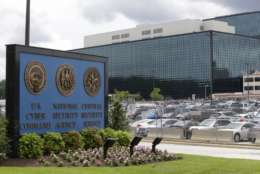Cybersecurity
-
In today's Federal Newscast: Sen. Ron Wyden (D-Ore.) wants agencies to investigate what he calls Microsoft's "lax cybersecurity practices." GSA's commercial platforms initiative is gaining steam. And Sen. Elizabeth Warren (D-Mass.) wants answers to "price gouging" by TRICARE.
July 28, 2023 -
Two big ticket federal cybersecurity initiatives took big steps forward this week, but their ultimate outcomes remain less than certain
July 26, 2023 -
Congress authorized the creation of the Office of the National Cyber Director back in 2021, and the White House issued the National Cybersecurity Strategy earlier this year. So how is it doing implementing said strategy? Well, the Government Accountability Office looked to answer that very question with a snapshot of where things stand.
July 26, 2023 -
The nominee to lead Cyber Command says the new authorities will put CYBERCOM on par with the likes of U.S. Special Operations Command from a programming and budgeting perspective.
July 24, 2023 -
CISA's Michael Duffy provides an overview of the past, present and future of the landmark CDM program in an exclusive interview.
July 21, 2023 -
In the world of quantum computers, the need for an advanced approach to cybersecurity is more necessary than ever. As a result, thought leaders in the post-quantum cryptography (PQC) space are looking for ways to…
July 20, 2023 -
Yes, there’s a federal cybersecurity workforce gap, but it’s not a pipeline issue, says Pluralsight’s Aaron Rosenmund. “We have this massive talent gap at an intermediate and advanced level. You can’t go recruit them.” Learn what you can do instead.
July 20, 2023 -
CISA’s zero trust model provides federal agencies with a clear path to follow, making it another vital tool to help define the zero trust journey — one that will help them meet the September 2024 deadline set by the Office of Management and Budget's memo.
July 19, 2023 -
Tom Voshell, vice president, Federal Program Office at Coupa Software, joins host Roger Waldron on this week's Off the Shelf to discuss data management and cyber security with a focus on the Department of Defense’s upcoming release and implementation of an updated version of its Cybersecurity Maturity Model Certification (CMMC 2.0).
July 18, 2023 - Cybersecurity labeling for smart devices aims to help people choose those less vulnerable to hacking
The Biden administration and major consumer tech players are launching an effort to put a nationwide cybersecurity certification and labeling program in place. The program announced Tuesday is to help consumers choose smart devices that are less vulnerable to hacking. Officials liken the new U.S. Cyber Trust Mark initiative to the Energy Star program, which rates appliances’ energy efficiency. The initiative will be overseen by the Federal Communications Commission. Industry participation is voluntary. Amazon, Best Buy, Google, LG, Logitech and Samsung are among industry participants. The labels are for products including baby monitors, home security cameras, fitness trackers, TVs and smart climate control systems. The labels could be ready by next year.
July 18, 2023 -
Bills to modernize cybersecurity hiring, broaden AI training and streamline regulatory documents advance out of the House Oversight and Accountability Committee.
July 17, 2023 -
A purpose-built, on-premises collaboration solution gives your organization a secure environment to centralize the technology tools, content and communications needed to respond to and audit any incident that threatens your mission.
July 17, 2023 -
In January 2022 the Office of Management and Budget published its M-22-09 memorandum on zero trust that mandated compliance with specific goals by the end of fiscal 2024.
July 14, 2023 -
Marine Innovation Unit expands its staff as it takes on more projects and moves toward full operational status.
July 13, 2023 -
The White House on Thursday released an implementation plan for its National Cybersecurity Strategy. The plan outlines 65 high-impact initiatives agencies must meet to stay ahead of emerging threats, and sets a timeline to complete those goals.
July 13, 2023













